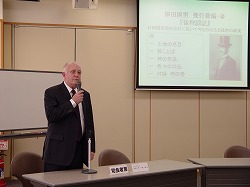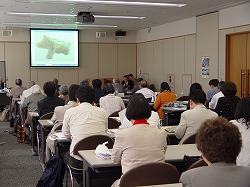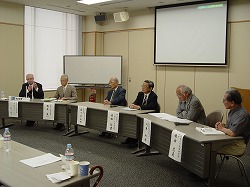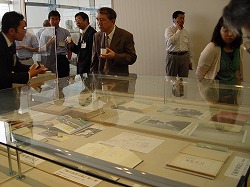nochi kari kotoba no ki
Publication of Yanagita Kunio’s Nochi kari kotoba no ki (Notes on traditional hunting lore) : a 100th Anniversary Symposium
・Date: Friday, 5 June 2009, 13:00-18:30
・Venue: Hosei University Ichigaya Campus Boissonade Tower 26F Conference Room A
・Chair: Josef KREINER (Special Professor, Hosei University)
 |
 |
 |
 |
The Research Center for International Japanese Studies held its “Publication of Yanagita Kunio’s Nochi kari kotoba no ki (Notes on traditional hunting lore): a 100th Anniversary Symposium” on 5 June. Yanagita Kunio greatly influenced research of the history of thought and cultural history in Japan throughout the 20th century. 100 years ago, in spring of Meiji 42 (1909), Yanagita published, with his own funds, what was to become the first work in the field of folklore studies, Nochi kari kotoba no ki. The previous year, Meiji 41, he found some time out to walk through the mountains of Kyushu, whilst on a south-west Japan observation mission as an elite bureaucrat from the Ministry of Agricuture and Industry. What he saw and heard there, and the data he collected chiefly from the hunting culture and slash-and-burn farming of Shiiba Village, he presented in the work as a basis for his own Japanese cultural theory. In other words, he emphasized that Japanese ethno-culture was not uniform and stemming from one origin, rather it emanated from, perhaps, several, but at least two, clearly different composites. Yanagita himself insisted that Nochi kari kotoba no ki should signify the beginning of Japanese folklore studies.
To mark the 100 years since its publication, Hosei University hosted this symposium with a successful outcome, thanks to the cooperation of country-wide scholars experienced in Yanagita research and Shiiba Village fieldwork. Our university library also took the opportunity of purchasing an original edition containing Yanagita’s signature, and it will be housed in the rare book collection. Throughout the symposium this was exhibited along with other related material.
There are plans to publish the papers and discussions in one volume of the Research Center for International Japanese Studies Series.
Report by: Josef KREINER (Special Professor, Hosei University)


